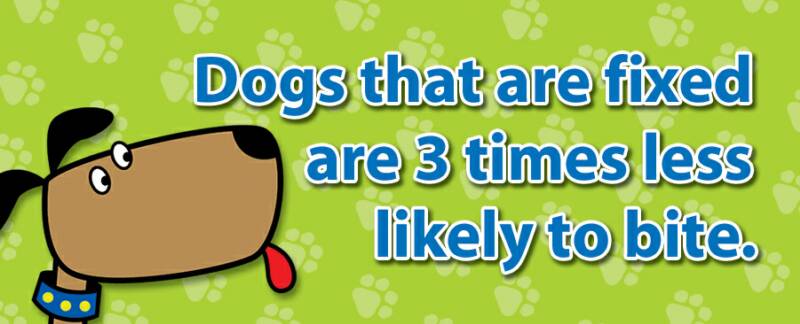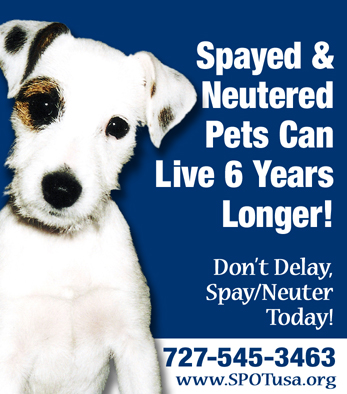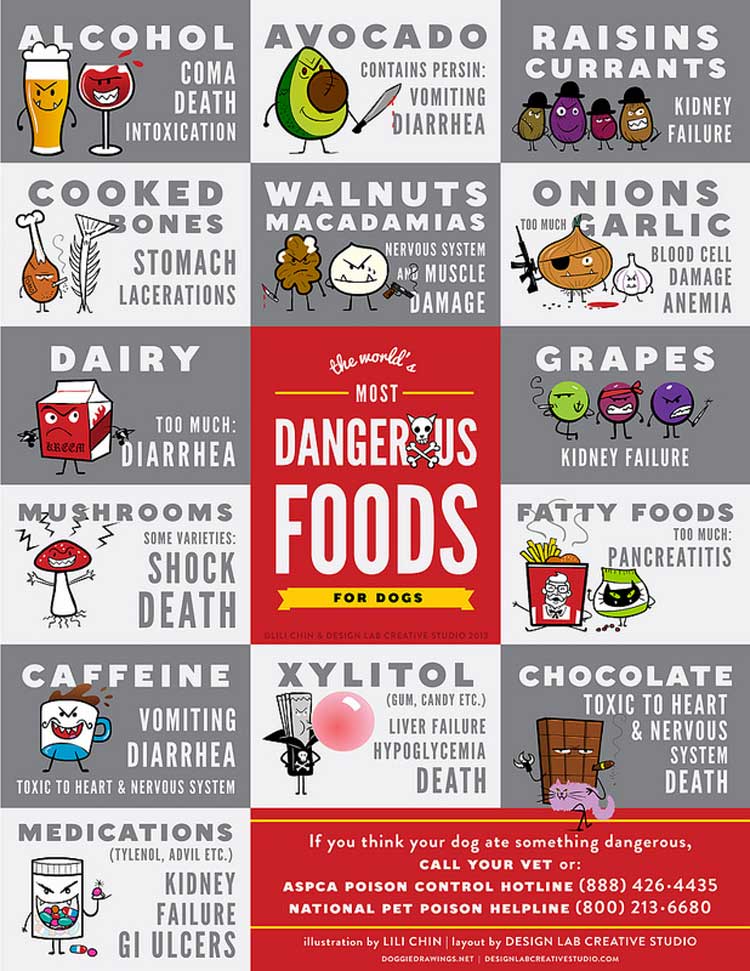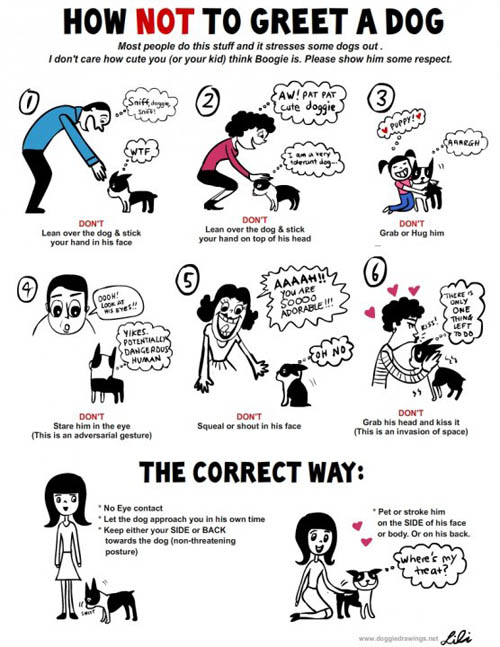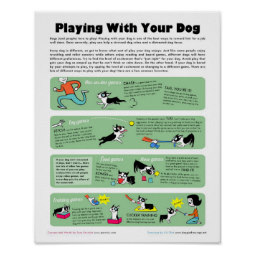All About Dogs!
SPOT 4403 62nd Ave Pinellas Park, FL 33781 SPOTusa@yahoo.com
Dogs
Having a dog as part of your family can be fun and very rewarding. Dogs will be your Best Friend, they will love you unconditionally and be your companion. Dogs are pack animals, and are dependant on you to be responsible to give them what they need to be healthy and happy! Dogs are great, but they do need a lot of extra time and energy to care for them properly.
Food & Water
Food & Water is essential for the health of your pet and the better the food, the healthier your pet will be.
First choice is Raw pet food
Second choice is a Balanced home prepared diets if you follow recipes found in reputable pet nutrition books.
Third choice would be Freeze dried or Air dried Raw food
If you choose to feed a dry food make sure you read the labels to avoid toxic ingredients. Grains are just fillers. Dry foods don't list carbohydrates on the label and consist of 40-60% Carbohydrates, which turns into sugars and creates havoc on their system. Ironically grain free kibble has more carbohydrates than regular kibble.
Dogs are Carnivores and don't need grains and fillers in their diet.
Avoid:
- Meat By Products: this is what is left over after the meat has been stripped off the carcasses, ingredients not ordinarily consumed by humans, (beaks, feet entrails etc).
- Chemical preservatives: BHT/BHA, Propyl gallate, have been associated with carcinogenesis and EQ or Ethoxyquin was first used as a rubber stabilizer and effective insecticide and pesticide. Do you really want these toxic chemicals in your pet's food?
- Sodium Nitrate: is a coloring agent and fixative known to cause cancer
Vaccines
Puppies should receive Parvo and Distemper Vaccines, starting at 9 weeks, followed by a booster 3 weeks later and then one year later. Rabies vaccine should be given at 4 months. It is the law to give a rabies booster 1 year after the first rabies vaccine, then every 3 years.
Spay/Neuter
Fixing your pets is the most important thing you can do for their health. Fixed pets live up to 6 years longer.
It prevents deadly cancers of the reproductive system in both males and females. Fixing your pet also prevents unwanted behaviors: escaping to find a mate, fighting over territory, spraying and marking, messy heat cycles and coming home pregnant. Dogs that are fixed are 3 times less likely to bite. Millions of pets are euthanized each year because their are too many pets and not enough homes. Fixing your pets prevents accidental litters. Dogs can get pregnant as early as 6 months. Don't Delay Spay/Neuter Today!
Training
Positive training can save your pets' life! Training is learning how to communicate with your pet. Start training right away, ten minutes, 2 or 3 times a day during the first couple of weeks with your dog; will make your life easier. Dogs are like kids, you need to set the boundaries and let them know what is allowed and not allowed in a positive way. It's great to love your pet, but very important that they know the rules for their own protection. Most dogs want to please you and will respect you for being in charge. It's very stressful for a dog to be the leader. It's great to take puppies to puppy classes for socialization with the other dogs. Problem dogs should go through private lessons; and everyone can train their dogs at home.
Fleas and Ticks
Get a flea comb and check your pets every time you bring them home from a dog park or any park.
Fleas and Ticks are parasites that thrive on unhealthy animals. There are flea treatments that are convenient and effective like Simparica, Credillio and Nexgard.
Treat your yard with Mosquito Barrier or Diatomatious Earth
Treat your house with Fleabusters carpet powder once a year.
Heartworms
The best cure is prevention with a monthly dose of Heartgard plus, Iverhart plus, Simarica trio and Trifexis chewables. It's much cheaper and less dangerous to use the preventative than to treat a heartworm positive dog.
Exercise and Grooming
All Dogs need exercise and grooming. How much depends upon the breed; read more below.
We love to talk on the phone, dogs love to go for walks. It's a way that they can get out and explore the neighborhood and communicate with other dogs. That's why they do so much sniffing and peeing!
Collars and Leashes
Avoid using choke, pinch or shock collars, they can damage the neck and back of the animal. Proper training will allow you to use normal collars, gentle leaders and harnesses. Avoid using flexi leashes, they are dangerous for you and your pet. There is no control over your pet with these leashes, and you or your pet can get tied up in them and seriously hurt. A 6 ft leash is all you need for walks.
Breeds
If you are thinking about getting a dog or have a specific breed, make sure you read everything about the breed. Dogs were breed for specific jobs and if they don't get to release that energy doing the job that they are breed for, they will be unhappy and so will you. Go to your library and pick up a book, plus contact one of your local purebred rescues, they will tell you all the pros and cons of the breed. Rescues want you to know what you are getting into, because 25% of the animals turned into the shelters are purebreds and rescues usually have at least 50-60 in foster care waiting to find a new home. To find a breed rescue near you click here
Bite Prevention...
Bite Prevention can save your child's life & your dog's life too!
Dogs that are spayed or neutered are 3 times LESS likely to bite!
If your dog bite's a human it is an instant death sentence for your dog.
50% of all children are bitten before their 12th birthday.
The vast majority of dog bites are from a dog known to the child (his or her own pet, a neighbor or friend). You can prevent this from happening to your child. Discuss with them how to behave properly around dogs.
Here are a few tips.
* Never stare into a dog's eyes
* Never tease dogs behind fences
* Never go near dogs chained up in yards
* Never touch a dog you see loose outside
* Never run or scream if a loose dog is near
* If you see a loose dog, tell an adult immediately
* If a dog comes near you, stand very still like a post and be quiet
* Never touch or play with the dog while they are eating
* Never touch a dog while they are sleeping
* Only pet a dog if you have permission from the owner
* Let the dog sniff your closed hand before petting
It's Too Hot for SPOT!
Did you know that a dog left in a car can collapse of Heatstroke in just minutes?
This can cause brain damage and even death.
On a 78 degree day, a car parked in the sun can reach 160 degrees in minutes!
Even opening windows or parking in the shade won't help.
It's also against the law!
Pinellas County Ordinance 828.3 $500 fine or 60 days in jail.
Please leave your pets at home. If you see a dog in a car, notify the store manager to page the customer, or notify the police!


